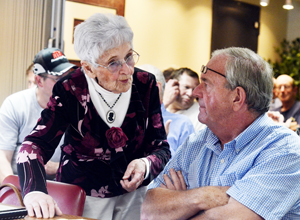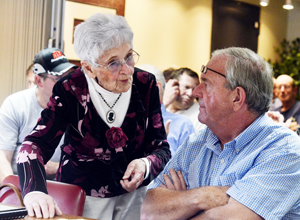

copyright the Chronicle June 18, 2014
by Joseph Gresser
DERBY — As determined by the ballot and by anecdotal evidence, a large percentage of Derby residents favor the new Walmart Super Center slated for construction on Route 5. But that doesn’t mean some don’t have serious reservations about the project.
Those reservations, particularly ones concerning how the 160,000-square-foot store will affect traffic and the economy of the town were well aired in a pair of hearings held at the Derby Municipal Building Monday and Tuesday.
Developer Jeff Davis, whose firm Shattuck Hill Investments will build the store and act as Walmart’s landlord, appeared with a host of consultants at each meeting. The first of his appearances was before the Derby Planning Commission, the second before the District #7 Environmental Commission.
Each of the two meetings drew over 40 town residents.
A major source of concern was how bad traffic will be once the store is built. Not only drivers, but also abutting landowners, worried about the effect more shoppers will have on the flow of traffic in the area.
Consultant Jennifer Conley spoke at both meetings. She said her studies lead her to expect about a 30 percent increase in traffic. Ms. Conley said Route 5 should be reconfigured at the entrance of the Walmart to allow for turning lanes in each direction.
She said a stop light should be installed at the junction of Walmart’s entrance road and Route 5, and another at the off ramp coming from the northbound side of Interstate 91, which intersects with Route 5. Shattuck Hill Investments will pay its fair share of the cost of installing the lights, she said.
Her suggestions drew skepticism from those attending Monday’s meeting. Chris Blais of Derby Line suggested that a stoplight will be needed at the turnoff for the southbound side of Interstate 91.
Ms. Conley said her data does not indicate that area will be a problem. Without the data, she said, the state would not allow a signal to be installed.
Planning Commission Chairman Joe Profera challenged Ms. Conley’s information on the Shattuck Hill Road approach to the store. He suggested that more people than the study predicts will use the back road, either to bypass the store or to avoid congestion on the way to a shopping trip.
Mr. Davis consulted with Ms. Conley and said he would agree to a permit condition requiring his company to pay for widening the road. He said he would pick up the tab for a turning lane, or if that is not possible because of right-of-way issues, to widen it as much as is practical.
On Tuesday, John Dunleavy, an assistant attorney general assigned to the Vermont Agency of Transportation (VTrans), asked the Act 250 commission for 30 days to formulate a reply to Ms. Conley’s report. He said his agency only received it on June 6.
Eugene Reed, the chairman of the District #7 Environmental Commission, conferred with Mr. Davis and granted VTrans 30 days from the time they got the report.
Mr. Dunleavy was able to correct Ms. Conley’s assumption that Shattuck Hill Investments will have to pay only its fair share. A new law that calls for such sharing will not take effect until July 1, he said. Therefore, the project will have to assume the full cost of mitigation.
“Do you understand what that means?” Mr. Reed asked the crowd. “It means that Walmart is on the hook.”
“Not Walmart,” Mr. Davis replied, “Shattuck Hill Investments.”
Mr. Reed made no secret of his concern about traffic on Route 5. He said he brings his driver’s education students down from Canaan to give them experience driving in bad traffic.
Ms. Blais agreed that traffic will probably get worse when the new store opens, but said, “If we’re going to embrace the future, we’re going to have to sit in traffic.”
The question of how much of the cost of mitigating the effects of the new Walmart came up in a more contentious way on Tuesday after economist Richard Heaps gave a quick overview of the costs and benefits of the store.
While Walmart will bring 260 jobs to the area, he said, it will cost about 40 existing jobs because of the competition it brings to the area. When the costs of the project are balanced against the benefits in property taxes, he said, the town will be ahead by about $3,000.
Derby resident Vicky Farrand-Lewis was outraged that the benefit to the town would be so small and was not mollified by the suggestion that Derby could institute a local option sales tax of 1 percent. Mr. Heaps calculated that could bring the town about $1.5-million in additional income each year.
Ms. Farrand-Lewis rejected that idea as an additional tax on local residents. Instead, she suggested that Walmart, as one of the nation’s biggest corporations, should contribute more to the town.
Mr. Davis turned to Ms. Farrand-Lewis and asked, “Are you suggesting that Walmart should pay to come into the town? What is the right amount other than mitigating its actual impact?”
“I want to make sure Walmart is mitigating all possible impacts on Derby,” Ms. Farrand-Lewis responded.
Brian Smith, the chairman of the Derby Selectmen, said he thought Ms. Farrand-Lewis had lost sight of the fact that the town would come out ahead, even if only by a little, after covering all the expenses that might come with hosting a big box store.
Although, most people said they want a discount store in the area, not all agreed that the proposed Walmart is the right size.
On Monday, Jim Campbell, a local real estate agent, said even people who strongly favor the store are amazed when he tells them the new store will be about three times as big as the Derby Price Chopper.
Paul Prue of Derby Line objected both days to Walmart as a store that costs people jobs and imports cheap foreign goods.
“I’m a union man, and I buy American,” he declared Monday.
Mr. Prue’s statement was immediately countered by Mickey Hansen, who said he also belongs to a union, but strongly favors the competition and lower prices offered by Walmart.
Giselle Seymour, who is possibly the strongest supporter of the Derby Walmart, made her voice heard Tuesday as Mr. Reed polled the crowd to see who wished to seek party status in the Act 250 proceedings.
Ms. Seymour, though, had a message that couldn’t wait.
“I hope you don’t slow down the project, whatever you do,” said the Derby resident, who organized a massive petition campaign to encourage the retailer to come to Derby.
When Mr. Reed explained it wasn’t time to start talking about delay, Ms. Seymour had a quick reply.
“Not time?” she said. “I can’t wait.”
Ms. Seymour turns 96 this Saturday.
She will have to wait a bit more before the planning commission and the environmental commission make their decisions. If the process proceeds smoothly Mr. Davis said construction could start early next year.
contact Joseph Gresser at [email protected]
For more free articles from the Chronicle like this one, see our Editor’s Picks pages. For all the Chronicle’s stories, pick up a print copy or subscribe, either for print or digital editions.







